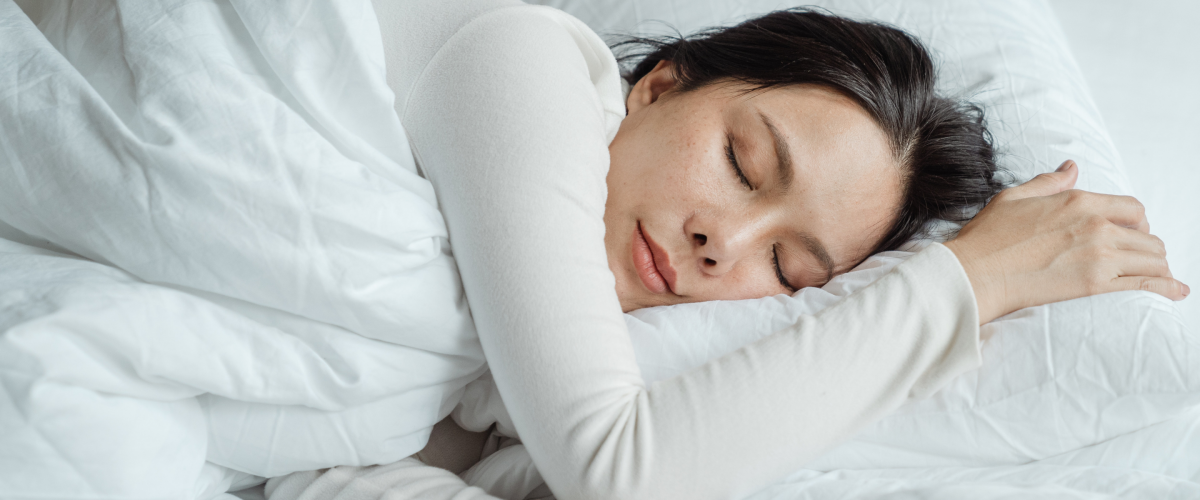- September 21, 2021
- Rebecca Fitzpatrick, PharmD, Pharmacist/Clinical Services Coordinator
- Healthy Living

Are you reading this blog at 11:30 p.m. on your phone in bed? Technology is so integrated into our lives in today’s world, and it can feel impossible to get away from it! More than one-third of adults in the United States get less than the recommended seven or more hours of sleep per night. The quality and quantity of your sleep directly impact your health and well-being in so many ways, including greater risk of workplace accidents, diabetes, cardiovascular disease, stroke, obesity, depression, and especially motor vehicle crashes!
The recommended hours of sleep per day changes as we age. According to the American Academy of Sleep Medicine (AASM) and CDC, most adults should aim for 7-8 hours of sleep per night. AASM has a bedtime calculator you can use to help determine when you should head to bed! sleepeducation.org/healthy-sleep/bedtime-calculator/
Table Source: www.cdc.gov/sleep/about_sleep/how_much_sleep.html
Sleep Disorders
Before we get into the best ways to improve your sleep, let’s go into a general overview of sleep disorders. There are four primary sleep disorders: insomnia, narcolepsy, restless legs syndrome (RLS), and sleep apnea.
Insomnia
Insomnia is portrayed by an inability to start or maintain sleep. There are other diseases that can cause insomnia, and different types of insomnia exist, such as early morning awakening, where the person wakes several hours earlier than wanted and has difficulty resuming sleep, or chronic psychophysiological insomnia, which results from a stressor and fear of being unable to sleep.
Narcolepsy
Narcolepsy is also known as excessive daytime sleepiness or irresistible sleepiness combined with muscle weakness.
Restless Legs Syndrome (RLS)
Restless legs syndrome (RLS) usually presents as an unpleasant “creeping” sensation beginning in the lower legs but can sometimes include aches and pains.
Sleep Apnea
Sleep apnea characteristics include the individual making periodic gasping or snorting sounds during which sleep is interrupted. Certain untreated medical conditions can make this worse, such as congestive heart failure or nasal obstruction. Generally, sleep studies (polysomnography) are completed with a somnologist or other physician. The most common treatment for sleep apnea is a continuous positive airway pressure (CPAP) device.
Sleep hygiene is one of the best ways to help improve your sleep and overall health.
Graphic Source: https://www.goodtherapy.org/blog/how-poor-sleep-affects-hormones-and-mental-health-1029157/sleep-hygiene-infographic
- Keep a consistent sleep schedule, even on weekends or during vacations
- Ensure the bedroom is quiet, dark, relaxing, and at a comfortable temperature
- Turn off electronic devices at least 30 minutes before bedtime (yes, even that phone you’re reading this off of right now!)
- Avoid large meals, caffeine, and alcohol before bedtime - this could increase acid reflux and cause other gastrointestinal symptoms that will distract your body from sleeping
- Exercise regularly and eat healthy
Treatment Options
There is a handful of over-the-counter options to assist with sleep. Overall, the safest option is melatonin. Melatonin is a hormone naturally found in our bodies, and it helps regulate our circadian rhythm, which tells your body when it should be awake versus sleep. The standard dosing range is between 1-10mg per night, and the usual starting dose is 3-5mg about an hour before bed. After about seven nights, you can decide if it helped and increase or decrease the dose as desired.
Many patients use diphenhydramine (Benadryl) to help them sleep. It can be found in combination products such as Tylenol PM, Excedrin PM Headache, and many other cold & cough products. This medication is on the Beers List, a high-risk medication list recommended to be avoided in patients over 65 years of age. This medication can cause urine retention, confusion, sedation, and may increase the risk of falls.
For more information on additional treatment options, please refer to your provider.







